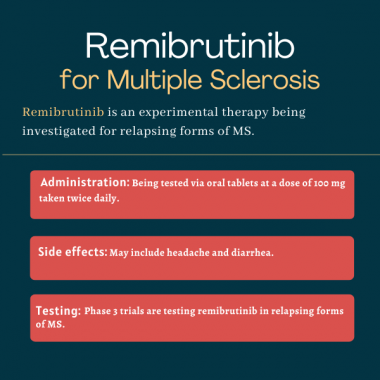
FAQs about remibrutinib in MS
Remibrutinib is an experimental medication that has not been approved to treat multiple sclerosis (MS) or any other indication. The therapy is designed to block the activity of a protein called Bruton tyrosine kinase, which is important for the activity of certain immune cells that contribute to MS damage. By inhibiting this protein, this medication is expected to reduce the inflammatory autoimmune attack that drives MS.
Remibrutinib is undergoing testing in multiple sclerosis patients in Phase 3 clinical trials. If the results are positive, it is possible that they could support future applications seeking the medicine’s approval from regulators in the U.S. or elsewhere. However, it is too early to say if or when the therapy might be approved.
Clinical trials testing remibrutinib in multiple sclerosis patients are not enrolling people who are pregnant or breastfeeding. Moreover, all participants with the ability to reproduce are required to use effective methods of contraception. It is unknown if this treatment can safely be taken during pregnancy.
There are not yet any clinical data available on the potential efficacy of remibrutinib in people with multiple sclerosis. Top-line data from the ongoing Phase 3 trials are expected in 2025.
Neither hair loss nor weight gain was reported as a side effect of remibrutinib in a Phase 1 trial that tested the medication in healthy volunteers. Patients who experience unexpected reactions to new medicines are advised to talk to their healthcare providers.
 Fact-checked by
Fact-checked by 


